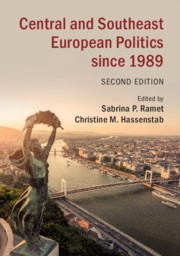Book contents
- Central and Southeast European Politics since 1989
- Central and Southeast European Politics since 1989
- Copyright page
- Dedication
- Contents
- Figures and Maps
- Tables
- Contributors
- Preface
- Glossary
- Guide to the Pronunciation of Central and Southeast European Words
- Additional material
- Part One Introduction
- Part Two Issues
- Part Three Central Europe
- Part Four Yugoslav Successor States
- Part Five Southeastern Europe
- 16 Romania: In the Shadow of the Past
- 17 Bulgaria since 1989
- 18 Albania since 1989: The Hoxhaist Legacy
- Part Six Present and Future Challenges
- Index
- References
17 - Bulgaria since 1989
from Part Five - Southeastern Europe
Published online by Cambridge University Press: 16 September 2019
- Central and Southeast European Politics since 1989
- Central and Southeast European Politics since 1989
- Copyright page
- Dedication
- Contents
- Figures and Maps
- Tables
- Contributors
- Preface
- Glossary
- Guide to the Pronunciation of Central and Southeast European Words
- Additional material
- Part One Introduction
- Part Two Issues
- Part Three Central Europe
- Part Four Yugoslav Successor States
- Part Five Southeastern Europe
- 16 Romania: In the Shadow of the Past
- 17 Bulgaria since 1989
- 18 Albania since 1989: The Hoxhaist Legacy
- Part Six Present and Future Challenges
- Index
- References
Summary
Looking back from 2018, Bulgaria has turned into a country substantially different from the Soviet satellite it was in 1989. Today, the country is a member both of NATO and of the European Union, and it has a stable democracy and a functioning market economy. The authors explore Bulgaria’s transition to democracy, democracy-building through party transformation, and institutional changes. The chapter follows up on the birth and development of civil society and the challenges to media freedom. Bulgaria’s transformation went through the process of dismantling of the pre-1990 one-party state and the establishment of a multiparty democracy, liberal society, and a market economy while the state gradually adopted European norms, policies, and practices. The text opens up for discussion current political issues such as the safeguarding of minority and refugee rights, the fight against corruption and organized crime, and the inequitable distribution of the country’s wealth. The biggest concern in the social and political landscape recently is the decreasing fairness of the electoral process. Heavy social dependencies and insufficient incomes in the country are consciously sustained by the political elites to facilitate their maintenance of incumbency. Nevertheless, Bulgaria has not seen any of the violent conflicts that have afflicted the rest of Southeastern Europe.
Keywords
- Type
- Chapter
- Information
- Central and Southeast European Politics since 1989 , pp. 449 - 476Publisher: Cambridge University PressPrint publication year: 2019
References
Further Reading
- 2
- Cited by

